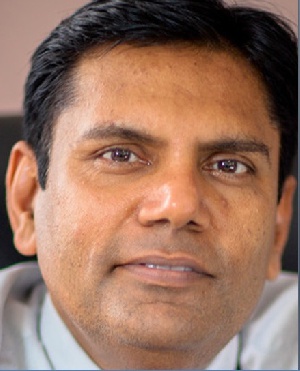Olam Ghana, a subsidiary of Olam International -- a leading global agri-business operating from seed to shelf in 65 countries - this year crosses the 20-year milestone as a corporate citizen of Ghana.
Established in 1994, Olam Ghana is currently the biggest agro-commodity company in the country, operating an integrated product portfolio that includes cocoa, cashew, tomato-paste, palm oil, rice, wheat and sugar. For most of its 20 years of operations in Ghana, Olam has ranked among the country’s leading Licenced Buying Companies (LBCs) and is a leading trader of Ghana’s cocoa beans into European and Asian markets.
An important country for Olam in Africa, Olam has made significant investments across the supply chain in Ghana -- from supporting farmers to the construction of a wheat mill at Tema. With its workforce of 650 permanent staff and 400 outsourced workers, it is considered one of the largest revenue contributors to the national kitty; earning GRA’s ‘Best Taxpayer Award’ for three consecutive years. It has also previously been recognised by the Ghana Export Promotion Council for its contributions toward expansion of the economy’s non-traditional sector.
With a grassroots presence in more than 80 towns and villages across the country, Olam runs a sustainable farmer livelihood improvement module that touches the lives of nearly 300,000 farmers throughout the country.
To appreciate the underlying philosophy that has made Olam such a relevant player in the economy, our reporter takes a look at the company’s business by exploring the key lines of operation in Olam’s product portfolio. He does so through talking to the official behind the wheels -- Mr. Amit Agrawal, Country Head of Olam Ghana.
Here are excerpts of their interaction:
BFT: Olam has been operating in Ghana for 20 years, why did Olam choose to operate here and what has been your experience?
Olam’s heritage lies in Africa -- we first started in Nigeria in 1989 exporting cashew. From there we came to know Ghana in 1994 and recognised its strengths in the production of nuts such as cashew, and of course cocoa. However, we also saw we could work with Ghana to import products enjoyed by consumers such as rice, tomato-paste and sugar. I have headed Olam Ghana for 7 years, and to see the business grow to now employ over 650 Ghanaians, from Accra to all corners of the country, has been very positive.
BFT: Most people are particularly interested in your company’s role in the non-traditional agricultural sector. Cashew is quite an uncommon product -- how did Olam Ghana become the largest exporter?
Mr. Agrawal: You are very right about our special interest in cashew in our Ghana business. As we may all know, cashew is consumed all over the world primarily as a snack, and on a more industrial scale as an ingredient in confectionery. International trade in the crop is relatively young, having begun just about seventy years ago.
Notably, Ghana and West Africa lag a little behind other producer regions in developing the immense economic potential of cashew as a cash-crop. Olam is an active member of the African Cashew Alliance, which works tirelessly to address this situation. We are currently the largest exporter of the crop from Ghana. In our bid to stimulate sustainable interest and growth in cashew farming, we have helped over 20,000 Ghanaian farmers organise themselves into associations to make them easily accessible to inputs such as fertiliser, education and incentives.
We have trained about 15,000 Ghanaian farmers on good agric practices in cashew production -- the interesting observation being that half of this number comprised women. During the past 24 months, we have given to farmers some 12,840 hybrid saplings (free of charge) along with free weedicides to boost production, and we have provided GH?40,000 worth of pre-season interest-free loans to farmers to cater for pressing family expenditures.
All these efforts have allowed us to become the largest exporter of Cashew from Ghana.
BFT: Over the past two or so years, wheat flour has featured prominently in your local product portfolio? How important has this business been? Do you have other manufacturing interests as well?
Mr. Agrawal: Wheat flour is a significant and highly demanded food component among Ghanaians -- a consumption trend that Olam believes has grown significantly over the past few years as incomes increased in the country. In 2012 we invested in a US$55.0million state-of-the-art wheat mill at Tema. With a capacity of 500 metric tonnes per day, we believe that this mill has helped to reinforce Ghana’s food security status -- bread, biscuits and pastries being popular low-cost staples here. Our experience in Ghana is now being replicated as we are establishing wheat mills in Senegal and Cameroon.
We have also developed a special relationship with local bakers by helping them to modernise their bakeries as a way of unlocking value for both of us. Through pre-finance we help bakers upgrade their old and inefficient equipment to deliver high capacity, energy efficiency and superior product quality. One baker told us that his gas-use has been reduced by almost 50%.
Closely intertwined with our wheat flour operations is the vision of producing quality made-in-Ghana biscuits to meet local demand, and that vision came to fruition when we invested in a manufacturing facility, also at Tema, which today produces some of the most fancied brands on the market -- like ‘Milky Magic’ and ‘King Crackers’.
We also operate a processing and canning facility for tomato-paste, the largest of its kind in West Africa. We market this under the popular Tasty Tom brand.
BFT: Would you say there are any challenges to working in Ghana?
Mr. Agrawal: I don’t think anyone would be surprised if I say that the currency slide has been an issue, but Olam has confidence in the government. We agree with the President that reducing imports is part of the structural solutions needed, and indeed we are working on some initiatives such as supporting local rice.
BFT: If I may draw you back to your company’s role in helping to develop non-traditional crops, I can recall that some years ago Olam was spearheading efforts to transform the seed cotton sector into a more viable agricultural activity in Ghana. How are your cotton operations doing?
Mr. Agrawal: You are right, Olam has in the past been very determined to turn the fortunes of cotton around in the Ghana market. I regret to say, however, that as part of our global strategy to optimise our business, Olam is exiting cotton in Ghana; but we remain firmly committed to our other operations across the country.
BFT:Olam is almost synonymous with cocoa in Ghana, and the ostensible reason is that your company is a leading licenced buying company (LBC). What factors drive your successes in the cocoa operations?
Mr. Agrawal: Well, Olam has been a leading buying company since 1999, and we can highlight a functional presence in 85% of cocoa growing areas in Ghana. Our cocoa business thrives on a set of collaborative support systems which we initiate with the sector’s stakeholders from time to time. We have replicated Olam International’s special sustainability and alternative livelihood programmes for the farming communities we operate in, and we are very actively associated with relevant cocoa value-chain activities in Ghana: such as cocoa processing and production of cocoa fertilisers.
We are also actively looking at how we can help Ghanaian farmers to mitigate against climate change impacts; so for instance -- together with the Rainforest Alliance -- we have worked toward producing ‘climate smart’ cocoa in the Bia landscape; an initiative considered to be the first in the world. As I speak, we are also working with COCOBOD and the Forestry Commission on the World Bank’s Emission Reduction Programme for Ghana, and our efforts in that direction have been acknowledged as part of Ghana’s submission to the World Bank.
BFT: What do you think would encourage more investment in Ghana?
Mr. Agrawal: Once the single market of ECOWAS is fully functional, Ghana will become even more attractive to investors as it will be an ideal hub to operate out of to access the West Africa market. However, today the robust GDP growth seen over the last decade alone has been enough to attract significant interest. Collaboration between local and international private, public and not for profit organisations, where experiences can be shared and expertise maximised, will help Ghana to advance further still.

Workers taking notes at the factory
Business News of Tuesday, 6 May 2014
Source: B&FT













